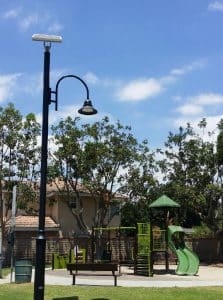The Cost of High Temperatures on Solar Panel Lighting Systems (and How to Combat Them)Posted by in Most Popular.
There's always a concern about heat mixed with electronics--leave your smartphone in a hot car, and it may actually turn into an expensive brick once the internal components fry from prolonged exposure. It's no secret that heat will cause electronics to malfunction, although the case is a little different with a solar light. We're sure someone in the past has held concerns about how a solar light performs when the panels (and the important components of the light) sit in the sun and bake. The bad news is that there is an unwanted affect of high heat on solar panels, the lights, and some of the components for the system. The good news is that the effect of baking in the sun is not as terrible as you might think, and there are options to circumnavigate those problems. The heat won't be cooking the panels or lights to a "dumb brick" state, but here are some facts on what really happens when a solar street lighting system faces some scorching days and what you can do to protect your investment against them. How Heat Affects Different Solar PanelsWhen discussing solar panel efficiency and how that relates to temperature, it's important to be concerned about what's called the temperature coefficient. This concept is expressed in a Celsius degree. If a particular panel has a temperature coefficient of -0.25% per degree of Celsius, every degree that it rises above the standard testing threshold of 25 degrees suggests that it loses a quarter of a percentage of efficiency. The math is pretty simple. With that particular temperature coefficient, let's say a solar panel heats up to 38 degrees Celsius, which is 18 degrees beyond the standard testing threshold. That means in that particular heat, the solar panel has lost 4.5% of its efficiency. It's not any sustainability-threatening factor, but heat definitely robs the solar panel of some power. With that in mind, it's important to find the best solar lighting system with the lowest temperature coefficient. That's going to ensure that when your solar panels see some scorchers they still produce significant power. After all, a solar panel is meant to be in the sun. The lowest tested temperature coefficient will reduce the impact of high heat on your panels. An average temperature coefficient is -0.5%. Any panels rated below that will definitely be worth the initial investment--get as much power available from the sun as possible. Further advancements in solar technology will likely see temperature coefficients drop into the 20s or even teens. That's an exciting trend we hope to see in the near future. How Heat Affects the Electronics of an LED LightLED lights absolutely love cooler weather. It's a fact that they are more energy-efficient in winter and cold environments, but LEDs aren't as impactful in high heat. The quality of light and lifespan of an LED light can be affected from heat exposure, but heat dissipation depends on a few factors:
It's important to check with the manufacturer in order to get proper ratings for heat exposure. Cree LED lights are rated pretty highly to withstand the hottest climates and operate best around 25 degrees Celsius, although they still operate fine after exposure in prolonged temperatures above that. As far as the heat produced by a solar LED light, the fixtures themselves don't actually produce much heat at all. Heat is produces within the diode itself, and a properly designed fixture can dissipate that heat directly away from the lighting subject. The hottest surface of an LED is, on average, 50% cooler than other lights! They're often cool to the touch. You could even place your palm against the light fixture and not worry about getting burned--seen as incandescent bulbs waste about 90% of their energy as heat, we don't recommend touching them. Bottom line though, when you have a street lighting system built up entirely of LED fixtures, there isn't much to be concerned about when it comes to high temperatures. The lights are pretty stable in any environments, hot or cold. That's a sign of quality. Heat on BatteriesHeat is a definite battery killer simply because prolonged exposure can lead to leaks, corrosion, a shortened lifespan, or a combination of all of these problems. When you have batteries exposed to constant sunlight within a solar street lighting system, the higher the temp of the batteries, the more power they produce--to their detriment! The battery lifespan will actually deteriorate when exposed to high heat. Recent research online shows that a rise in 8 degrees Celsius cuts the life of the battery in half. That's significant for a temperature change, and so we can understand concerns about how a lighting system might function when it's battery-powered. It's important to find methods to regulate the temperature for the battery to maximize its lifespan. How to Combat the HeatAt Greenshine New Energy, our solar street lighting systems are built to combat the heat. We utilize mono-crystalline solar panel technology with temperature coefficients that match the technology standard today of -0.5% in order for our panels to stay as efficient as possible. Our batteries are engineered to utilize approximately only 18 percent of their charge, so even in the highest temperatures you'll see less degradation over time. Enjoy that 5 to 7 year timespan of battery life on the solar light with very little maintenance. Our lighting systems come with a myriad of options as well. If the batteries will get constant exposure to extreme heat, you can bury the battery in the ground for higher protection against the elements. We've thought ahead of all possibilities when it comes to extreme temperatures, weather of all sorts, and degradation of our components. When you go with Greenshine, rest assured that you're getting components that can take a lot of mother nature's abusive weather patterns. Our configurable systems are designed to get maximum results regardless of how much the sun bakes the area--that makes it the best solar lighting system available on the market for the money. Contact us to learn more, and happy trails.
Most Popular
|
ArchivesNo Archives Categories
Want More Info? |
LATEST NEWS & ARTICLES

